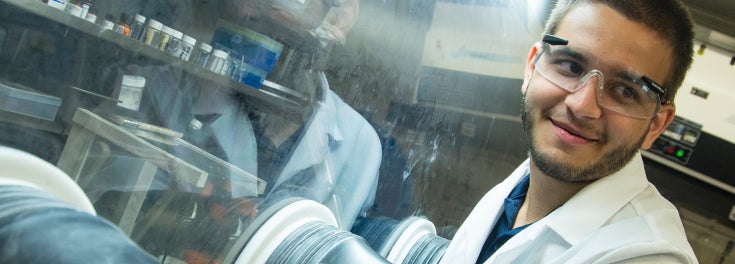 Each year in late July, more than 100 students from colleges throughout Rhode Island attend our Summer Undergraduate Research Fellowship (SURF) conference, concluding a 10-week research experience in which undergrads conduct hands-on projects in biomedical, behavioral, environmental and life sciences. At the conference, the students showcase their work, and many say their SURF involvement is among the best 10 weeks of their educational experience.
Each year in late July, more than 100 students from colleges throughout Rhode Island attend our Summer Undergraduate Research Fellowship (SURF) conference, concluding a 10-week research experience in which undergrads conduct hands-on projects in biomedical, behavioral, environmental and life sciences. At the conference, the students showcase their work, and many say their SURF involvement is among the best 10 weeks of their educational experience.
URI junior Samuel Spink completed his second fellowship this summer by working in a chemistry lab to refine a process that could reduce the amount of chemical waste in the plastics industry. The biomedical engineering and Spanish major said the opportunity to work on such projects through the SURF program has given him confidence in his ability to perform in a research lab. “I have the potential to publish my results, and I’ve developed strong ties to an entirely new network of students and professors.”
The program, which provides undergrads with unique opportunities to be part of a research team for the summer, is an outgrowth of two federal research programs based at URI that together have been funded with more than $87 million in federal grants. That funding provides each student fellow with a stipend so they can focus on their research and not on how to generate income for the summer.
There is no better feeling than working in the lab. I’m learning, gaining skills, and getting to put them into practice.
“I applied to be in the program to get some exposure to a research lab environment, enhance my knowledge, and work with graduate students and professors that have plenty of experience to share,” Samuel said.
Biological sciences major Ryan Quinn also just completed her second SURF fellowship. She said her study of how an invasive species of mussel affects the soils and greenhouse gases in coastal marshes helped her gain new lab and field techniques while reaping the benefits of being mentored. “And I’m realizing how much fun science can be,” she said.
Biochemistry major Kelsey Wright’s dream of a career in neuroscience got a boost when she became a SURF fellow, and her placement in an Alzheimer’s behavior testing lab was the perfect fit. She is examining how the behavior of mice changes when they are exposed to lead.
“Graduate schools want to see you doing these kinds of things,” Kelsey said. “They want to see that you put in hours at a lab and that you are ahead in research. This experience will help me when I’m applying for grad school.”
Besides, she said, there is no better feeling than working in the lab. “I’m learning, gaining skills, and getting to put them into practice,” she said. “Time flies when I’m in the lab.”
With experiences like these on your resume, you’ll not only have the opportunity to gain vital experience, you’ll be well poised to compete for research jobs at universities, hospitals, pharmaceutical and engineering companies, and government agencies—anywhere life-changing work is being done.
